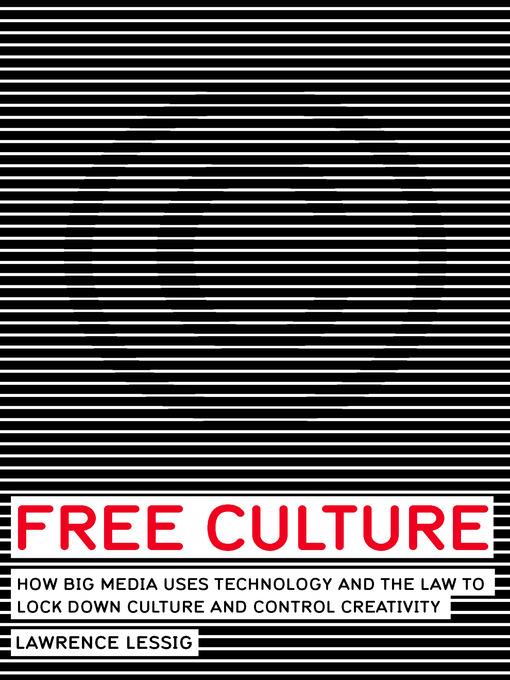
Free Culture
The Nature and Future of Creativity
فرمت کتاب
ebook
تاریخ انتشار
2004
نویسنده
Douglas M. Bakerنویسنده
John Marinoنویسنده
Douglas M. Bakerنویسنده
John Marinoنویسنده
Lawrence Lessigشابک
9781101200841
کتاب های مرتبط
- اطلاعات
- نقد و بررسی
- دیدگاه کاربران
نقد و بررسی

Starred review from January 26, 2004
From Stanford law professor Lessig (Code
; The Future of Ideas
) comes this expertly argued, alarming and surprisingly entertaining look at the current copyright wars. Copyright law in the digital age has become a hot topic, thanks to millions of music downloaders and the controversial, high-profile legal efforts of the music industry to stop them. Here Lessig argues that copyright as designed by the Framers has become dangerously unbalanced, favoring the interests of corporate giants over the interests of citizens and would-be innovators. In clear, well-paced prose, Lessig illustrates how corporations attempt to stifle innovations, from FM radio and the instant camera to peer-to-peer technology. He debunks the myth that draconian new copyright enforcement is needed to combat the entertainment industry's expanded definition of piracy, and chillingly assesses the direct and collateral damage of the copyright war. Information technology student Jesse Jordan, for example, was forced to hand over his life savings to settle a lawsuit brought by the music industry—for merely fixing a glitch in an Internet search engine. Lessig also offers a very personal look into his failed Supreme Court bid to overturn the Copyright Term Extension Act, a law that added 20 years to copyright protections largely to protect Mickey Mouse from the public domain. In addition to offering a brilliant argument, Lessig also suggests a few solutions, including the Creative Commons licensing venture (an online licensing venture that streamlines the rights process for creators), as well as legislative solutions. This is an important book. "Free Cultures are cultures that leave a great deal open for others to build upon," he writes. "Ours was a free culture. It is becoming less so." (Mar. 29)
Forecast:
This book will have a wider appeal than Lessig's previous works, and author appearances in New York and San Francisco could attract buyers. With peer-to-peer file sharing constantly making headlines, the book has added relevance.

Starred review from April 15, 2004
Lessig (Stanford Law Sch.; The Future of Ideas) has written an important book about the intrigues and interactions of copyright, intellectual property, and technology. Named a special master in the Microsoft antitrust case to advise the court on technological matters, the author is certainly a strong believer in the protection of copyrighted work, but he also feels that the situation has become so extreme in this country that it is stifling innovation, strangling competition, and, more ominously, placing limits on personal freedom. He chronicles how copyright developed in this country, offering numerous examples of minor infringements that have brought about technological breakthroughs, e.g., photography. Unfortunately, notes Lessig, with changes in copyright law and increasingly vigilant copyright holders, there have been disturbing attacks. Take, for instance, the Recording Industry Association of America's attempts to close down file-sharing companies like Napster and Kazaa; individuals have even been accused of piracy for downloading music from the Internet. Although some of Lessig's legal arguments may seem abstruse, this is a seminal and provocative work from one of our most brilliant legal scholars, not to mention a thoughtful, well-reasoned attempt to find a middle ground that signals a return to an older concept of free culture. Highly recommended for all libraries.-Richard Drezen, "Washington Post," New York City Bureau
Copyright 2004 Library Journal, LLC Used with permission.

February 15, 2004
Lessig looks at the disturbing legal and commercial trends that threaten to curb the incredible creative potential of the Internet. All innovations are derived from a certain amount of "piracy" of preceding innovations, Lessig argues, and he presents a catalog of technological breakthroughs in film, music, and television as illustrations. Drawing on distinctions between piracy that benefits a single user and harms the owner and piracy that is useful in advancing new content or new ways of doing business, Lessig strongly argues for a balance between the interests of the owner and broader society so that we can continue a "free culture" that encourages innovation rather than a "permission culture" that does not. He reviews an array of legal actions, including the restrictions on peer-to-peer sharing made famous by Napster, and the threat they represent to the kind of openness the law has traditionally allowed and from which the marketplace has benefited. This is a highly accessible and enlightening look at the intersection of commerce, the law, and cyberspace.(Reprinted with permission of Booklist, copyright 2004, American Library Association.)

























دیدگاه کاربران